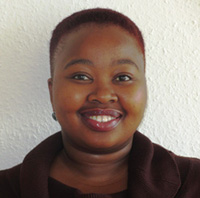TDR Clinical R&D Career Development Fellows is honing her skills in operational research to close the gap between innovation and implementation. Citizen of Swaziland is working with the Foundation for Innovative New Diagnostics (FIND) on the
development, evaluation and implementation of novel tuberculosis rapid diagnostic tools. 
Dr Welile Sikhondze joined FIND in June of 2013. She has transitioned from patient care to public health, putting aside long harbored dreams of becoming a neurosurgeon and deciding instead to concentrate on tuberculosis (TB) clinical research in Swaziland, her home country, which has the highest TB and HIV incidence rates globally. Dr Sikhondze is currently completing her Master of Public Health (Clinical Epidemiology) degree at the University of Cape Town in South Africa.
“The decision to train in public health instead of specializing in neurosurgery was spurred on by my experience working in a rural hospital in Swaziland,” she says recalling the many challenges patients faced in gaining access to rapid and accurate clinical diagnosis and appropriate treatment. “I focused on improving patient clinical outcomes, particularly of tuberculosis.” After earning her MD, Dr Sikhondze went on to work as a sub-investigator on TB vaccine clinical trials at the University of Cape Town (UCT) before moving over to the university’s division of medical microbiology as a clinical research fellow on TB diagnostic clinical trials. “That’s when I really developed an interest in conducting high quality clinical research, from product development to implementation,” she says.
Going from clinical trial to impact
When it comes to TB diagnostics, she says, the clinical trial is but one aspect of the product development pipeline. “I have developed an interest in understanding the best methods required to support successful integration of novel technology into existing health systems—what needs to be done in terms of health system strengthening in preparation for new diagnostic technology. ” In her 6 months at FIND, Welile has been addressing that challenge through her work in FIND’s TB clinical trials unit and downstream activities programme.
Welile attended the 44th Union World Conference on Lung Health in Paris last year, which she says was “highly beneficial in assisting her to gain insight into the direction and development of future TB research questions”. Together with Dr Mwancha-Kwasa, she also attended the 6th Moving Forward in Diagnostics Forum in Annecy France organized by BioMérieux and the London School of Hygiene and Tropical Medicine (LSTMH). Both Fellows found the Diagnostic Forum to be extremely useful, with Dr Sikhondze adding, “It helped me better understand the different aspects of the diagnostic pipeline and the importance of an interdisciplinary approach to developing new diagnostic tools.”
My experiences have been extremely helpful to better understand the different aspects of the diagnostic pipeline and the importance of an interdisciplinary approach to developing new diagnostic tools.- Dr Welile Sikhondze, TDR Career Development Fellow from Swaziland
Within her first few months at FIND, Sikhondze has already had an impact on the organization, say her supervisors. “Welile’s arrival coincided with a period of organizational change,” says Pamela Nabeta, a medical officer at FIND. “Yet despite this she managed to establish a place for herself on the TB team,” using her previous experience in data management and data analysis to fill a gap left by the departure of FIND’s former data manager. “She was able to facilitate the smooth continuation of projects,” says Nabeta, calling Sikhondze’s contributions “crucial to our work.”
Returning home to reduce barriers to new tools
Following the fellowship, Sikhondze says she’ll return to Swaziland where she utilize her training in TB diagnostics to conduct operational research that can improve the challenges and barriers to the successful implementation of novel diagnostic tools. She also plans to conduct impact assessments on successfully implemented tests. Hopefully, the findings can be used in advising policy-makers and global health partners on the end-user requirements of point-of-care tools for TB diagnosis.

